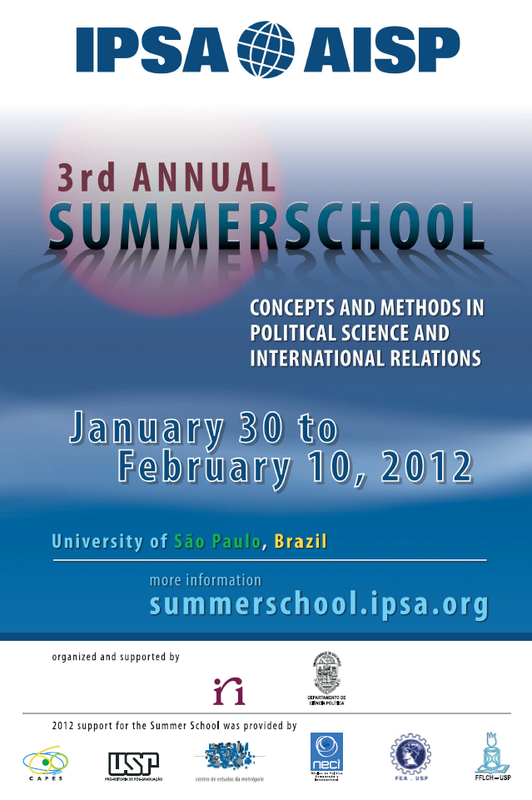 January 30, 2012 - February 10, 2012
January 30, 2012 - February 10, 2012
University of São Paulo
São Paulo, Brazil
Building on the First and Second IPSA Summer Schools held at the University of São Paulo in 2010 and 2011, the Third Annual IPSA Summer School set out to achieve three goals in 2012:
1. To train current and future scholars in cutting-edge social science methods, including qualitative and quantitative data analysis, as well as research design and research methods.
2. To bring together advanced social science scholars from the University of São Paulo, the rest of Brazil, other countries in Latin America, and the broader world in such a way as to create broad research networks that can stimulate the exchange of ideas, techniques and advanced methods across national and sub-disciplinary boundaries.
3. To further consolidate the effort to establish a Summer School in Latin America that can serve as a global center for the propagation of advanced methods and techniques in political science research.
Courses were offered in a variety of quantitative and qualitative fields:
1. Qualitative Comparative Analysis (QCA) and related methods (Professor Dirk Berg-Schlosser, Philipps University Marburg)
2. Mixed methods design (Prof. Max Bergman, University of Basel)
3. Analyzing cross-national data sets with multivariate techniques (Prof. Bruno Cautrès, Sciences Po, Paris)
4. Behavioral games and strategies in politics (Prof. Rebecca Morton, New York University)
5. Quantitative textual analysis (Prof. Iñaki Sagarzazu, Nuffield College, University of Oxford)
6. Multiple regression analysis (Prof. Guy Whitten, Texas A&M University)
7. Case study methodology – small-n research designs (Prof. Derek Beach, University of Aarhus, Denmark)
8. Communications and applied research for political and policy stakeholders (Prof. Clifford Young, IPSOS-Washington)
9. A Practical Introduction to Bayesian Statistical Modeling (Prof. Simon Jackman, Stanford University)
For the first time, Professors Lorena G. Barberia, Glauco Peres da Silva and Fernando Guarnieri from the University of São Paulo taught a one-week refresher course in mathematics and statistics in the week preceding the Summer School. The course provided basic training in mathematical concepts and statistics to prepare students for the courses offered in the IPSA Summer School 2012.
Students met each day for classes in their specific courses, with many instructors lecturing in the morning hours and then conducting computer labs, group exercises, or study sessions in the afternoons.
Students were also invited to participate in four informational sessions during lunch times, on the subjects of “Careers Outside of Academia”; “Visiting Scholar and Post Doc Positions Abroad”; “Graduate Studies Abroad”; and, “Publication Strategies.” These proved to be quite popular among the students, and led to spirited question and answer periods.
Parallel with, and complimentary to the Summer School, the International Seminar program in the late afternoons served as a useful form of outreach, by which instructors and Brazilian faculty working on related questions presented their research findings to the broader university community. It also served as a useful means of introducing students to other instructors’ research and methods. In 2012, two seminars were devoted to examining “Voting and elections”, one seminar was focused on examining “The state of the discipline” and one seminar on “Globalization and the economic crisis”. The International Seminar program was very popular, bringing together both Summer School students and the local academic community in numbers that frequently surpassed 100 people. Full video of the information and seminar sessions were recorded and became available at the School website.
The School admitted 138 students, 41% of them female. The median age was 30; the average age was 32. Students came from 44 different institutions in 15 different countries: Brazil, Argentina, Germany, Chile , Colombia, Czech Republic, Spain, Italy, Portugal, Ukraine, Montenegro, Russian, Slovak Republic, USA, Belgium and Venezuela.
The School was coordinated by Prof. Dirk Berg-Schlosser (Executive Director); Prof. Eduardo Marques; Prof. Leandro Piquet Carneiro; Prof. Lorena Barberia and Prof. Daniela Schetini (Local Organization Committee)
Special Activities
Additionaly to the courses, the Summer School offered special activities. It also included four informational sessions during lunch times, on the subjects of “Careers Outside of Academia”; “Visiting Scholar and Post Doc Positions Abroad”; “Graduate Studies Abroad”; and, “Publication Strategies".
Parallel with, and complimentary to the Summer School, the International Seminar program in the late afternoons served as a useful form of outreach, by which instructors and Brazilian faculty working on related questions presented their research findings to the broader university community. It also served as a useful means of introducing students to other instructors’ research and methods. In 2012, two seminars were devoted to examining “Voting and elections”, one seminar was focused on examining “The state of the discipline” and one seminar on “Globalization and the economic crisis”.
You may watch these activities using the following links:
The Summer School was developed as partnership between the International Political Science Association (IPSA), the Department of Political Science (DCP), the Institute for International Relations (IRI) at the University of São Paulo and the Brazilian Association of Political Science (ABCP), which joined the effort in 2012 for the first time.
Generous support for the Summer School was provided by the IPSA, by the Coordenação de Aperfeiçoamento de Pessoal de Nível Superior (CAPES), by Fundação de Amparo à Pesquisa do Estado de São Paulo (FAPESP), the University of São Paulo (Dean of Graduate Studies - Pró-Reitor de Pós-Graduação and Dean of Research - Pró-Reitor de Pesquisa), and by the Centro de Estudos da Metrópole (CEM).











